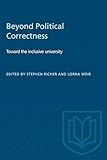Beyond Political Correctness : Toward the inclusive university / ed. by Lorna Weir, Stephen Richer.
Material type: TextSeries: HeritagePublisher: Toronto : University of Toronto Press, [1995]Copyright date: ©1995Description: 1 online resource (288 p.)Content type:
TextSeries: HeritagePublisher: Toronto : University of Toronto Press, [1995]Copyright date: ©1995Description: 1 online resource (288 p.)Content type: - 9780802077486
- 9781487574710
- 370.19/34 20
- online - DeGruyter
| Item type | Current library | Call number | URL | Status | Notes | Barcode | |
|---|---|---|---|---|---|---|---|
 eBook
eBook
|
Biblioteca "Angelicum" Pont. Univ. S.Tommaso d'Aquino Nuvola online | online - DeGruyter (Browse shelf(Opens below)) | Online access | Not for loan (Accesso limitato) | Accesso per gli utenti autorizzati / Access for authorized users | (dgr)9781487574710 |
Browsing Biblioteca "Angelicum" Pont. Univ. S.Tommaso d'Aquino shelves, Shelving location: Nuvola online Close shelf browser (Hides shelf browser)

|

|

|

|

|

|

|
||
| online - DeGruyter A Theory for all Music : Problems and Solutions in the Analysis of Non-Western Forms / | online - DeGruyter Gerhart Hauptmann : The Prose Plays / | online - DeGruyter Dryden : The Poetics of Translation / | online - DeGruyter Beyond Political Correctness : Toward the inclusive university / | online - DeGruyter The Infinite Moment and Other Essays in Robert Browning / | online - DeGruyter Shakespeare's Problem Plays / | online - DeGruyter The Canadian Brothers; or, The Prophecy Fulfilled : A Tale of the Late American War / |
restricted access online access with authorization star
http://purl.org/coar/access_right/c_16ec
The term 'political correctness' has lately been transformed into a weapon of neo-conservatism. Once used to poke fun at social movements and civil-rights group for occasional lapses into rigidity, it has since become a popular handle for the neoconservative critique of higher education. Aimed at anti-racist and anti-sexist initiatives within universities, colleges, and other major social institutions, the term is used to discredit such innovations as employment equity, selective recruitment of students from groups that have suffered systemic discrimination, sexual harassment policies, and women's studies programs, casting these as forms of tyranny that destroy academic freedom and merit. This anthology is the first sociological analysis of political correctness and the first study of the phenomenon in Canada. Contributors argue on behalf of an inclusive university, showing that recent reforms not only work toward broadening human rights but provide a welcome reorganization of knowledge. All but two papers have been written specifically for this text. Part One explores the history and social organization of the discourse, with the accent on Canadian material. The essays explore what the term has signified to different groups and to what ends they have used it. This section moves from an overview of political-correctness discourse to its explicit manifestation within universities in debates concerning academic ideals. Part Two looks at the classroom, a major site for building the inclusive university. Here, contributors explore feminist and anti-racist teaching and the limitations to such teaching imposed by the economic and political contexts of contemporary universities. As these scholars trenchantly reveal, the political-correctness debate will ultimately affect the lives of everyone. This book offers insight into the values, ideals, and motives of both sides.
Mode of access: Internet via World Wide Web.
In English.
Description based on online resource; title from PDF title page (publisher's Web site, viewed 01. Nov 2023)


